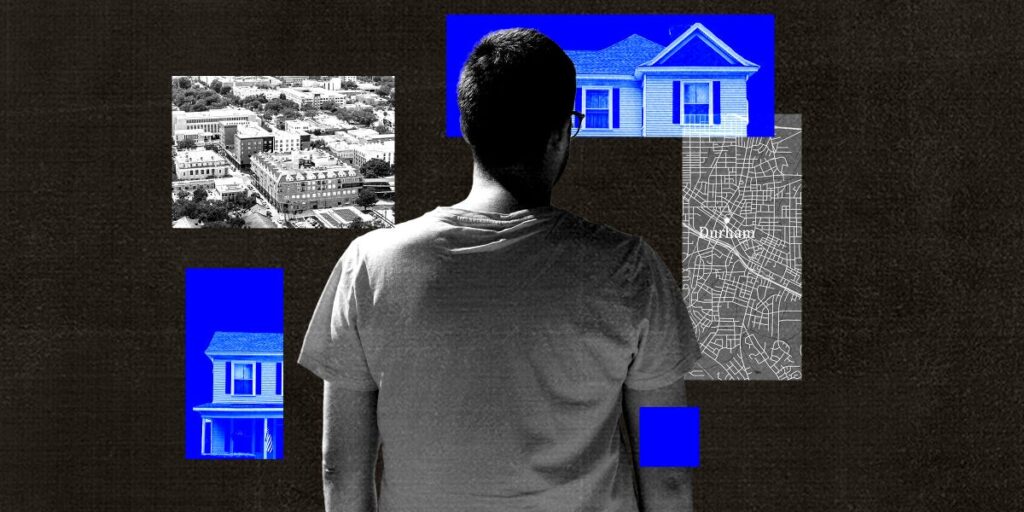- Gainesville and Durham piloted guaranteed basic income for formerly incarcerated people.
- Many formerly incarcerated people in the US do not have access to traditional social safety nets.
- Participants reported better financial resilience but struggled with housing costs after the program.
Six hundred dollars a month was the boost some formerly incarcerated people needed to rent apartments, cover unexpected expenses, and land steady jobs.
Gainesville, Florida, and Durham, North Carolina, recently tried using cash aid to help alleviate financial instability among formerly incarcerated residents, a demographic that is especially vulnerable to homelessness and food insecurity. Guaranteed basic income — which offers participants no-strings-attached payments — has been piloted across America as an approach to poverty reduction.
The cities aren’t the only places that have tried similar cash aid programs: the Center for Employment Opportunities gave cash to over 10,000 formerly incarcerated people across the US in 2020.
In Gainesville, 115 participants received an initial $1,000 payment followed by $600 a month for 11 months, ending in spring 2023. In Durham, 109 participants received $600 a month for one year, ending in spring 2023.
Both participant cohorts were compared to control groups of formerly incarcerated people who did not receive GBI, and the pilot results were published by the Center for Guaranteed Income Research at the University of Pennsylvania in February. The results are based on interviews with participants and surveys that were completed before, during, and six months after the program.
While some Gainesville and Durham participants struggled to maintain financial gains after their cash payments ended, most said the money allowed them to afford essentials and alleviated some stress, which helped their mental health. Rent, groceries, and household bills were commonly reported uses of the GBI payments.
“Guaranteed income really is just a tool to ensure, in the Gainesville and Durham cases especially, that no one is too poor to be free,” said Sukhi Samra, executive director of the advocacy group Mayors for a Guaranteed Income, which partnered on the pilots. “We’re not trapping people in a culture of poverty and in a culture of scarcity and lack.”
Cash helped formerly incarcerated people afford essentials
Formerly incarcerated people face higher rates of financial insecurity and unemployment compared to the rest of the population. This can make it difficult to afford basic needs. Per data published by the Bureau of Justice Statistics in 2022, the most recent year available, about a third of formerly incarcerated individuals aren’t hired in the four years after their release. Black people were also admitted to jail at more than four times the rate of white people as of 2022.
Most states give incarcerated people a small amount of money — between $10 and $200 — when they leave a prison or jail. However, some states restrict access to safety nets for formally incarcerated people. For example, Florida prohibits people who have been convicted of drug trafficking from accessing safety nets like SNAP and TANF.
Brianna Seid, a lawyer for the justice program at the Brennan Center for Justice, told Business Insider that $10 or $200 might help buy a train or bus ticket home, but it isn’t near enough to pay court fees, lease an apartment, afford childcare, or establish reliable transportation — especially if people face limited access to safety nets.
“There’s this idea that people get arrested or convicted, go to prison, and leave, and that’s just the end of the punishment,” Seid said. “I think for a lot of people, they don’t understand the ways that we excessively and perpetually punish people for having a criminal conviction, and it really touches every area of your life.”
Cash is a potential way to ease work and income barriers, she said.
In the Gainesville pilot, participants reported that guaranteed basic income helped them secure housing, have more hope, increase financial resiliency, and put food on the table. The share of participants who said they were “worried about having enough food” decreased from 59% at the start of the program to 49% six months after payments ended. The number of participants employed full-time also increased from 12% to 17% during that time.
Durham participants reported using GBI money to buy hygiene products, afford food, and build savings. The percentage of participants “worried about having enough food” also decreased from 59% at the start of the program to 44% six months after payments ended. Over that same period, the share of participants who felt they had enough money to support themselves rose from 3.7% to 18.35%.
Samra added that many participants in both Gainesville and Durham said that having extra cash helped them better adhere to probation requirements and prevent further arrests.
Many participants struggled with housing costs after the programs ended
Six months into receiving cash, 3% of Gainesville participants said they were experiencing homelessness. But six months after GBI ended, that figure had risen to 12%. In Durham, results showed that 29% of participants were severely housing-cost-burdened six months into the program, a number that rose to 41% six months after payments ended.
At the same time, Samra said that guaranteed basic income isn’t meant to be a cure-all poverty solution. GBI pilots are temporary, and she said the financial challenges some participants faced after the program show that more support is needed.
For Samra, there’s one major takeaway from the results: financial support is a step toward keeping people out of the prison system.
“These results show that if you provide a little bit of cash support, you’re allowing folks the space and the ability to not only re-enter and breathe,” she said. “And prevent the sort of harm and activities that they wouldn’t be doing if it weren’t for a simple lack of cash.”

